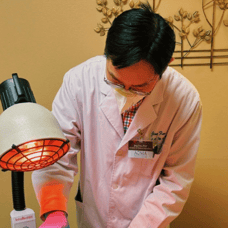
Introduction to TCM
Traditional Chinese Medicine (TCM) has been used for centuries to treat various ailments and promote overall health. Today TCM is gaining popularity worldwide due to its holistic approach to healing and prevention.
TCM originated in ancient China, with its earliest records dating back to the Shang Dynasty (1600-1046 BCE). It is a comprehensive system of medicine that encompasses a wide range of practices, including acupuncture, herbal medicine, qi gong, and tui na bodywork, among others.
The Principles of TCM
At the core of TCM is the belief in the interconnection between the mind, body, and spirit. TCM practitioners aim to achieve balance and harmony within the body by addressing underlying imbalances that cause illness or injury. The primary concepts of TCM include the theory of Yin and Yang, the Five Elements, and the concept of Qi (life energy).
TCM for Injury Recovery
- Acupuncture
Acupuncture is a popular TCM method that involves the insertion of thin needles into specific points on the body. It has been proven to be effective in reducing pain and inflammation, thus promoting faster recovery from injuries. Athletes can benefit from acupuncture as it can help reduce muscle soreness, alleviate joint pain, and improve circulation for faster healing.
- Herbal Medicine
TCM herbal medicine consists of natural plant-based remedies that can be used to promote healing and recovery. These herbs can be consumed in various forms such as teas, powders, or capsules. For athletes, specific herbal formulas can help reduce inflammation, improve blood flow, and support muscle and tissue repair.
- Tui Na Bodywork
Tui Na is a form of Chinese therapeutic bodywork that combines acupressure, stretching, and manipulation techniques to promote healing. It is particularly beneficial for athletes as it can help release muscle tension, reduce pain, and improve joint mobility. Tui Na can also help in injury recovery by stimulating blood flow and promoting the body’s natural healing process. By addressing muscular imbalances and promoting relaxation, Tui Na also can play a crucial role in preventing injuries and maintaining overall athletic health.
TCM for Injury Prevention
- Tai Chi
Tai Chi is a gentle martial art that focuses on slow, controlled movements and deep breathing. It is often referred to as “moving meditation” due to its calming effects on the mind and body. Regular practice of Tai Chi can help athletes prevent injuries by improving balance, flexibility, and overall body awareness.
- Qigong
Qigong is a system of coordinated body movements, breathing, and meditation used to improve overall health and well-being. It can help athletes prevent injuries by enhancing their flexibility, strength, and coordination. Additionally, Qigong’s focus on deep breathing and relaxation techniques can help reduce stress and improve mental focus, which can also contribute to injury prevention.
TCM for Improving Athletic Performance
- Dietary Therapy
In TCM, food is considered to be a form of medicine, and dietary therapy is an essential aspect of promoting overall health and well-being. TCM practitioners often recommend specific foods and herbs to enhance athletic performance, including those that support energy production, endurance, and recovery. Some examples of performance-boosting foods include goji berries, ginseng, and cordyceps, which are believed to increase stamina and strength.
- Cupping Therapy
Cupping is a TCM technique that involves placing glass or silicone cups on the skin to create suction. This process is thought to help improve circulation, remove toxins, and release muscle tension. Many athletes, including Olympic swimmers and professional football players, have turned to cupping therapy to enhance their recovery and performance. The increased blood flow and reduced muscle tension from cupping may help athletes to perform at their best and recover more quickly from intense training sessions.
- Mental Focus and Meditation
Meditation is a cornerstone of TCM practices that can significantly benefit athletes in terms of mental focus and concentration. By incorporating meditation into their training regimen, athletes can develop greater mental resilience, leading to improved decision-making and enhanced performance under pressure.
Integrating TCM into Your Training Regimen
To fully harness the benefits of TCM for injury recovery, prevention, and improving athletic performance, it is essential to incorporate these practices into your regular training routine. Consult a qualified TCM practitioner to develop a personalized plan based on your unique needs and athletic goals. This may include a combination of acupuncture, herbal remedies, dietary recommendations, and specific exercises such as Tai Chi or Qigong.
Conclusion
Traditional Chinese Medicine offers a holistic approach to injury recovery, prevention, and athletic performance enhancement. By incorporating TCM practices such as acupuncture, herbal medicine, Tai Chi, Qigong, and dietary therapy, athletes can improve their physical and mental well-being, leading to better overall performance. Consult a qualified TCM practitioner to develop a personalized plan tailored to your specific needs and goals.
FAQs
- Is TCM safe for athletes? Yes, TCM is generally considered safe for athletes when practiced by a qualified practitioner. However, it’s essential to consult with a professional before starting any TCM treatments or therapies.
- How long does it take to see results from TCM therapies? The duration of results may vary depending on the individual and the specific therapy or treatment being used. Some athletes may experience immediate benefits, while others may require several sessions or weeks of treatment.
- Can TCM be combined with conventional sports medicine? Yes, TCM can often be used in conjunction with conventional sports medicine practices. Many athletes find that combining TCM with other treatments, such as physical therapy, can provide enhanced benefits.
- Do I need a referral from my doctor to see a TCM practitioner? While a referral may not be necessary, it’s a good idea to consult with your primary healthcare provider before seeking TCM treatments, especially if you have any pre-existing medical conditions.
- How can I find a qualified TCM practitioner? To find a qualified TCM practitioner, it’s important to research their credentials and experience. Look for practitioners who have completed accredited TCM training programs and are members of recognized TCM professional organizations.







